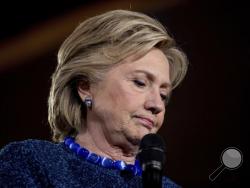WHITE PLAINS, N.Y. (AP) — For more than a year, Hillary Clinton has been a reluctant participant in the email controversy that has dogged her campaign, responding defensively to inquiries — and often only when there's a political imperative to do so.
On Friday, the imperative was clear.
The email issue flared up unexpectedly just over a week from Election Day, threatening Clinton's lead over Republican Donald Trump. The FBI announced it was looking into whether there was classified information on a device belonging to Anthony Weiner, the disgraced ex-congressman who is separated from longtime Clinton aide Huma Abedin.
Clinton stepped in swiftly, holding a brief, hastily arranged news conference in a high school choir room in Des Moines, Iowa. She challenged FBI Director James Comey to release the full details of the new investigation, citing the crucial phase of the White House race.
"We are 11 days out from perhaps the most important national election of our lifetimes. Voting is already underway in our country," Clinton said. "So the American people deserve to get the full and complete facts immediately. The director himself has said he doesn't know whether the emails referenced in his letter are significant or not."
Clinton said neither she nor her advisers had been contacted by the FBI about the new inquiry.
The news arrived with Clinton holding a solid advantage in the presidential race. Early voting has been underway for weeks, and she has a steady lead in preference polls, both nationally and in key battleground states.
The development all but ensures that, even should she win the White House, the Democrat and several of her closest aides would celebrate a victory a under a cloud of investigation.
Trump leapt on the FBI's disclosure, accusing Clinton of corruption "on a scale we have never seen before."
"We must not let her take her criminal scheme into the Oval Office," Trump said during a rally in New Hampshire.
Clinton's campaign was enraged by Comey's decision to disclose the existence of the fresh investigation in a vaguely worded letter to several congressional leaders. It wasn't until hours later that word emerged that the source of the new emails was Weiner, who is under investigation for sending sexually explicit text messages to a teenage girl.
"It is extraordinary that we would see something like this just 11 days out from a presidential election," said John Podesta, Clinton's campaign chairman.
Congressional Republicans have already promised years of investigations into Clinton's private email system. And that's only one of the email-related controversies facing her in the campaign's closing days. The tens of thousands of confidential emails from Clinton campaign insiders that were hacked — her campaign blames Russia — and then released by WikiLeaks have provided a steady stream of questions about her policy positions, personnel choices and ties with her husband's sprawling charitable network and post-presidential pursuits.
In his Friday letter to congressional leaders, Comey wrote only that new emails have emerged, prompting the agency to "take appropriate investigative steps" to review the information that may be pertinent to its previously closed investigation into Clinton private email system.
The FBI ended that investigation in July without filing charges, although Comey said at the time that Clinton and her aides had been "extremely careless" in using the system for communications about government business.
The agency, which did not respond to questions about Comey's letter and did not lay out a timeline for the review, is also investigating the recent hacks of Podesta's emails.
The swirling controversies have clouded what had looked to be a strong finish for Clinton's campaign. Moments before the FBI inquiry became public, her campaign announced plans to hold a rally in Arizona, a traditionally red state put in play by Trump's deep unpopularity among minority voters, Mormons and business leaders.
To the frustration of many in his party, Trump has struggled to consistently drive an attack against Clinton, often turning to personal denunciations of private citizens he feels have wronged him, like the Gold Star family of Capt. Humayun Khan, a Muslim-American soldier killed in action.
But he quickly pounced on the email news, seeing an opportunity to press the argument he's long tried to make against Clinton: that she thinks she's above the law and that she put U.S. security at risk by using her personal email.
After weeks of declaring the race "rigged" in favor of his opponent, he declared Friday he has "great respect" for the FBI and the Justice Department, now that they are "willing to have the courage to right the horrible mistake that they made" in concluding the investigation earlier.
As Clinton wrapped up her short comments to reporters Friday, she was asked whether she thought the new investigation would sink her campaign.
She walked away, responding only with a hearty laugh.
___
Associated Press writers Julie Pace, Steve Peoples, Julie Bykowicz, Jill Colvin, Will Weissert and Josh Lederman contributed to this report.

